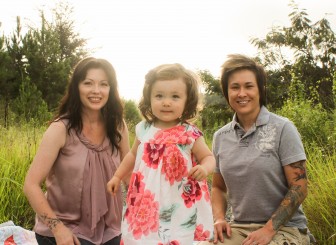Southeast is Home to Largest LGBT Population, Report Finds
Alexa and Barbie Batey met 12 years ago while playing in a Birmingham softball league. Alexa played third base. Barbie played left field.
“I had the best view ever,” she laughs.
Barbie thought Alexa was going to be a terrible softball player because she’s very feminine and wore pink outfits.
“And I was like, ‘She’s going to suck,'” Barbie says. “But she was awesome.”
Barbie was too shy to ask Alexa out, but eventually she worked up the courage to start talking to her. They started dating and for more than a decade have been apart only a handful of times. They got married in Washington D.C. in 2013 before gay marriage was legal in Alabama. They started a family two years ago and now have a daughter.
Alexa and Barbie were born and raised in Alabama, one of the most conservative states in the nation. Both say discrimination has never been an issue except by one person, Barbie’s mother. She’s Christian and doesn’t accept their lifestyle. Barbie’s relationship with her mother is rocky, but she tries not to think about it.
The Southeast is home to roughly 35 percent of LGBT people in the U.S., the largest LGBT population in the country, according to data compiled by the Williams Institute at UCLA. This find might seem surprising to some since most Southeastern states have few or no policies protecting LGBT people. A team of researchers in Georgia are seeking to learn more about the lives of LGBT people in the South. Eric Wright, who chairs the sociology department at Georgia State University, says there are a number of reasons why so many LGBT people call this region home.
“One of which is that the cost of living generally speaking is lower in the U.S. South than in other parts of the country,” he says. “There’s also been what some researchers have called a reverse migration, particularly of minorities.”
That means many Southern LGBT people who migrated to more progressive areas of the country are returning to the Southeast. To find out why so many call this place home, Wright and his research partner, Ryan Roemerman with the LGBT Institute created what they call the Southern Survey. It’s a comprehensive study that seeks to examine the lives of LGBT people across 14 Southern states.
“One of the things that we want to be able to accomplish through this survey is to be able to provide our non-profit partners across the South with data that they can use for policy development, grassroots organizing and fundraising,” Roemerman says.
The survey is by and for LGBT people in the South. This may help them better understand individual needs of the community, such as housing for transgender people or health services for lesbians living in rural areas, Wright says . And, he says, it will also help decipher the needs of this community in different Southern states. According to the LGBT Institute, more than half of the 100 anti-LGBT bills proposed this year were drafted in Southeastern states.
The survey is open through this month and the team expects to release its findings early next year.
Mideast clashes breach Olympic truce as athletes gather for Winter Paralympic Games
Fighting intensified in the Middle East during the Olympic truce, in effect through March 15. Flights are being disrupted as athletes and families converge on Italy for the Winter Paralympics.
A U.S. scholarship thrills a teacher in India. Then came the soul-crushing questions
She was thrilled to become the first teacher from a government-sponsored school in India to get a Fulbright exchange award to learn from U.S. schools. People asked two questions that clouded her joy.
Sunday Puzzle: Sandwiched
NPR's Ayesha Rascoe plays the puzzle with WXXI listener Jonathan Black and Weekend Edition Puzzlemaster Will Shortz.
U.S.-Israeli strikes in Iran continue into 2nd day, as the region faces turmoil
Israel said on Sunday it had launched more attacks on Iran, while the Iranian government continued strikes on Israel and on U.S. targets in Gulf states, Iraq and Jordan.
Trump warns Iran not to retaliate after Ayatollah Ali Khamenei is killed
The Iranian government has announced 40 days of mourning. The country's supreme leader was killed following an attack launched by the U.S. and Israel on Saturday against Iran.
Iran fires missiles at Israel and Gulf states after U.S.-Israeli strike kills Khamenei
Iran fired missiles at targets in Israel and Gulf Arab states Sunday after vowing massive retaliation for the killing of Supreme Leader Ayatollah Ali Khamenei by the United States and Israel.








